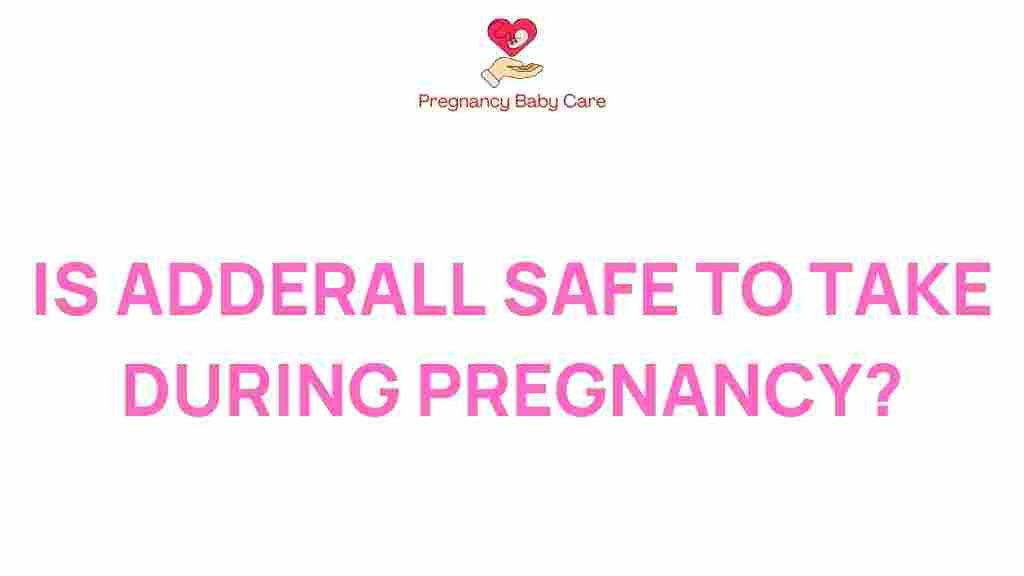The Safety of Adderall During Pregnancy: What You Need to Know
When it comes to managing Attention Deficit Hyperactivity Disorder (ADHD), Adderall is a commonly prescribed medication. However, for pregnant women, the question of pregnancy safety becomes paramount. Understanding the implications of taking prescription drugs like Adderall during pregnancy is crucial for both maternal health and fetal development. This article aims to provide comprehensive insights into the safety of Adderall during pregnancy, including medication risks, healthcare decisions, and considerations for ADHD treatment.
Understanding Adderall and Its Uses
Adderall is a combination of amphetamine and dextroamphetamine, classified as a central nervous system stimulant. It is primarily used to treat ADHD and narcolepsy. The medication works by altering neurotransmitters in the brain, which can help improve focus, attention, and impulse control.
For many, Adderall can be life-changing, enhancing daily functioning and quality of life. However, when it comes to pregnancy safety, the stakes are higher. Pregnant women must weigh the benefits of taking Adderall against potential risks to their developing fetus.
Medication Risks During Pregnancy
While Adderall is effective for managing ADHD, it is crucial to consider its effects during pregnancy. The potential risks associated with taking Adderall during pregnancy include:
- Potential Birth Defects: Some studies suggest a link between prenatal exposure to Adderall and certain birth defects, including congenital heart defects.
- Low Birth Weight: Babies born to mothers who took Adderall during pregnancy may have a lower birth weight, which can lead to further health complications.
- Preterm Birth: There is evidence indicating that stimulant medications may increase the risk of preterm labor.
- Withdrawal Symptoms: Infants exposed to Adderall in utero may experience withdrawal symptoms after birth.
It is essential for pregnant women considering or currently taking Adderall to consult with their healthcare provider to evaluate these risks in the context of their unique health situation.
Factors to Consider for Maternal Health
When making healthcare decisions during pregnancy, several factors should be considered:
- Severity of ADHD Symptoms: If ADHD symptoms are severe, the risks of not treating the condition may outweigh the potential risks of taking Adderall.
- Trimester of Pregnancy: The first trimester is crucial for fetal development, and some healthcare providers may recommend avoiding medications during this period.
- Alternative Treatments: Exploring non-stimulant medications or behavioral therapies as alternatives to Adderall may be beneficial.
- Personal Health History: A woman’s overall health and pregnancy history can significantly influence the decision about medication use.
A Step-by-Step Process for Making Informed Decisions
For pregnant women considering the use of Adderall, following a structured decision-making process can be beneficial:
- Consult Your Healthcare Provider: Schedule an appointment with your doctor to discuss your ADHD treatment and any concerns about pregnancy safety.
- Review Medical History: Discuss your medical history and any previous experiences with ADHD medications.
- Evaluate ADHD Symptoms: Assess the severity of your symptoms and how they may impact your daily life and pregnancy.
- Discuss Alternatives: Explore non-stimulant medications or behavioral therapy options that may be safer during pregnancy.
- Make an Informed Decision: Based on your discussions, make a decision that prioritizes both maternal health and fetal development.
Potential Alternatives to Adderall
If a healthcare provider determines that Adderall poses risks during pregnancy, they may suggest alternative treatments. These alternatives may include:
- Non-Stimulant Medications: Medications like atomoxetine (Strattera) are considered safer during pregnancy.
- Cognitive Behavioral Therapy (CBT): Engaging in therapy can help manage ADHD symptoms without the need for medication.
- Mindfulness and Lifestyle Changes: Implementing lifestyle changes, such as exercise, nutrition, and mindfulness practices, can help alleviate symptoms.
Monitoring Fetal Development
For pregnant women taking Adderall, regular monitoring of fetal development is essential. This includes:
- Ultrasounds: Regular ultrasounds can help assess the baby’s growth and development.
- Regular Check-Ups: Frequent visits to your healthcare provider can help monitor both maternal and fetal health.
- Discussing Concerns: Any concerns about fetal movement or health should be communicated to a healthcare provider immediately.
Healthcare Decisions: Weighing Risks and Benefits
Making healthcare decisions during pregnancy requires a careful balance between managing ADHD symptoms and ensuring the safety of the fetus. The following tips can help guide this process:
- Stay Informed: Research the latest studies and guidelines regarding Adderall and pregnancy safety.
- Communicate Openly: Have open conversations with your healthcare provider about your concerns and treatment options.
- Involve Your Support System: Discuss your healthcare decisions with family and close friends who can provide support.
- Consider Your Long-Term Health: Think about how your decisions will affect your long-term health and well-being.
Potential Troubleshooting Tips
If you encounter challenges while managing ADHD during pregnancy, consider the following troubleshooting tips:
- Document Symptoms: Keep a journal of your symptoms and any changes you notice in your mood or behavior.
- Seek Support: Join support groups for pregnant women with ADHD for shared experiences and advice.
- Practice Self-Care: Engage in self-care activities that promote relaxation and reduce stress.
Conclusion: Making Safe Choices for ADHD Treatment During Pregnancy
In conclusion, the safety of Adderall during pregnancy is a complex issue that requires careful consideration of medication risks, maternal health, and fetal development. Pregnant women must engage in informed healthcare decisions, consulting with their providers about the best course of action for managing ADHD symptoms. While Adderall may be effective for many, alternative treatments and lifestyle adjustments may provide safer options during this critical time.
If you are pregnant and struggling with ADHD, don’t hesitate to reach out to your healthcare provider to discuss your options and find the best path forward. For further information on managing ADHD during pregnancy, you can visit this resource or explore ADHD treatment guidelines.
This article is in the category Pregnancy and created by PregnancyBabyCare Team
